A record 530 people died by firearm suicide in Wisconsin last year. These gun stores hope to change that.

If you or someone you know is struggling or in crisis, call or text the National Suicide Prevention Lifeline at 988 or text “HOPELINE” to the National Crisis Text Line at 741741.
PARK FALLS - Chuck Lovelace carefully presses the stainless-steel frame of a Colt .357 Magnum revolver against a metal wheel, which makes a high-pitched hum as it polishes away years of rust and grit to restore the gun to its original shine.
Lovelace has been handling guns for most of his 45 years. A professional gunsmith, Lovelace repairs and restores firearms that have been damaged by years of wear, neglect and even fire, making them functional for generations to come.
The brilliant instrument that so fascinates Lovelace has also been used by several people close to him to end their lives: friends and family, fellow Army veterans, even one of his son's high school classmates.
The suicide Lovelace probably thinks about the most is that of a close friend who was a nurse and mother with three children. Lovelace and others close to her never got an inkling of the crisis she faced.
Every suicide, experts say, deeply affects at least two dozen people.
Lovelace was one of those. He still is.
“It was devastating to me, it really was, because she was a beautiful person,” Lovelace said.
Against this backdrop of pain, Lovelace was approached seven years ago about spearheading an effort to prevent gun suicides in Wisconsin ? starting at his own gun shop.
The idea was simple yet powerful: Train those at the counter of the gun store to be extra alert for signs of possible suicidal intentions, and to better use their discretion to deny such sales; and offer temporary storage of guns at the shop for anyone who wanted them, even for a short time, out of their house.
No questions. No judgment. And no police or other government involvement.
Today, there are nearly 40 gun shops in Wisconsin participating in the suicide prevention education effort, known as the “Gun Shop Project.” Many of those stores also offer to take in guns temporarily, an effort known as the “Safe Storage Initiative.”
The programs are part of a grassroots movement to address gun suicides that started in New Hampshire and has spread to more than 20 states.
Gun store owners have long grappled with the issue of suicide by their customers ? from those who have ended their lives on the store’s own shooting range to those who have died by suicide after leaving the store, either quickly or years later.
Suicide prevention experts say this effort and others, emerging from the gun-owning community, are vital and provide a possible roadmap for how hard-to-come-by common ground can be found in the issue of gun deaths.

Urgency around the issue of suicide is surging in Wisconsin and nationwide. Last year, there were a record number of suicides in Wisconsin and across the country, according to new data. Gun suicides topped 500 last year in Wisconsin for the first time.
A bill was introduced earlier this year in the Wisconsin Legislature that would bolster the gun stores’ anti-suicide efforts, providing grants for shops to buy safes for storing guns, to train employees and advertise the effort. It is the third time the bill has been offered, but it has not passed.
This year’s version has roughly an equal number of Republican and Democratic sponsors, a rarity in Wisconsin when it comes to gun measures. In the past eight years, there have been only two bills dealing with guns that drew the level of even bipartisan sponsorship that the current bill has, according to the state Legislative Reference Bureau.
Even with bipartisan backing, the future of the gun shop measure is uncertain. The $150,000 needed to fund it was not included in the budget advanced by Republican leaders and was not in the budget Gov. Tony Evers signed. The bill has been introduced again for possible action in the fall session.
Since the program wasn’t started by the government, it appears likely to continue regardless of the bill's outcome but grow at a slower rate. Gun stores across Wisconsin continue to sign up with the program, supported by the U.S. Department of Veterans Affairs in Milwaukee.
The number of guns held by Lovelace’s shop through the program has been modest – about a dozen in all over seven years.
“If I can help one person, that entire investment in seven years of working with this program," Lovelace said in an interview at his gun shop, "it was worth it. Because every life is precious.”

'Silence is killing people'
Suicide can be a taboo subject and maybe even more so among gun owners. Some worry talking about the toll from gun suicides could provide fodder for new firearms restrictions.
Lovelace says talking about ways of limiting gun suicides is not anti-gun, it is pro-person.
Sometimes Lovelace steps into uncomfortable conversations by raising suicide with fellow gun owners. He’s OK with that. The silence is killing people, he said.
There was a 41% increase in suicides in Wisconsin from 2004 to 2022, according to new figures from the Wisconsin Department of Health Services. During that time, the firearm suicide rate rose at a slightly faster rate than that of suicide by other methods, according to a Journal Sentinel analysis of state health data.
Guns are the most common method of suicide deaths in Wisconsin ? and gradually becoming more common. In 2004, firearms were used in 46% of all suicides in Wisconsin. By 2022, they were used in 58%.
That comes to roughly 885 people who died by suicide in the state each year over the past six years, with an average of 445 of those by firearms.

Veterans are among those people most likely to take their life with a gun, compared to other means, data show. Some 70% of all veteran suicides are done with guns.
Starting in 2001, suicides among veterans began to soar. By 2018, the suicide rate was 13% per year higher than pre-2001, according to a recent report on veterans suicide. The rate has begun to fall but still remains high.
For Lovelace, who served in the Army and finished a tour in Afghanistan 13 years ago, the issue is personal and urgent. He grapples with the trauma he encountered in the war, meeting regularly with a therapist and talking to friends.
The anti-suicide effort began in 2016 when Lovelace was approached by a high school friend who wondered if Lovelace would be interested in piloting a suicide prevention effort in his gun store, Essential Shooting Supplies, then in Dane County.
Gun shops in other states had done this. Maybe it could catch on in Wisconsin.
The idea came from Jean Papalia, a retired Madison police officer, who after 26 years on the job, wanted to channel her energy to a single cause.
“It's like if you have X amount of energy, what is it going to look like?” asked Papalia, 62. “So my energy is going after the biggest group."
That group is white males, 40 and older, according to state health data. The rate of gun suicides for white men in those age categories is two to four times higher than the rate for men of all other races, and the difference is even higher for women, according to the data from 2004 to 2020.
The Gun Shop Project was developed in 2009 at Riley’s Sports Shop in Hooksett, N.H., after three people died by suicide in just one week after buying guns from Riley’s.
Riley’s owner reviewed a video of the sales and saw no obvious warning signs based on the store’s training at that time. He decided more training was needed.
In each of the more than 20 states where the program has taken hold, there often is one gun store owner who becomes an evangelist for it, someone willing to put his or her credibility on the line.
In Wisconsin, that person is Lovelace. He is equally passionate about guns as he is about mental health.
Shortly before he agreed to have his shop be a pilot program, a gun sale happened that he and his wife will never forget.

Jennifer Lovelace was working the counter in late 2015 when a new customer, a man in his mid-20s, came in to buy a firearm. The man, who they later learned had lost his job, didn’t act unusual.
He later took his own life with that gun.
Gun store clerks know to look for signs, such as a person asking to buy a gun, without any specific model in mind, or purchasing a very limited amount of ammunition. Clerks can refuse such a sale.
As she looks back, Jennifer Lovelace said she had an off-feeling about the sale, but it wasn’t enough to deny it at that time. Today, though, she said she would not make that sale.
“I was devastated,” she said of the customer’s suicide.
A short time later, one of the store’s longtime customers who also was a friend of the Lovelaces took his life. Suffering from depression, the man gave all his guns to a family member except for one broken rifle. He was able to fix that gun just enough so it could fire once, Chuck Lovelace said.
With those deaths in mind, Lovelace decided he needed to do more than train himself, his wife and employees to detect potential suicidal customers.
The way to do it came to Lovelace when he and Papalia, the retired police officer, were at a suicide prevention luncheon in Madison. On the back of a napkin, Lovelace sketched out a plan for how to turn his store into a secure firearms storage location for gun owners in crisis.
Lovelace laid out a plan with a protective mechanism he knew from his time in the military: When bringing in their firearms, the gun owner is accompanied by a trusted person – a friend or family member.
Lovelace said he asks no questions, because the circumstances are none of his business. Knowing some people may feel shame about bringing in guns during a crisis, Lovelace records the guns as coming in for cleaning and carefully protects the person’s identity.
Lovelace will take in guns 24 hours a day, seven days a week. He can do that because he lives in the same building as his store.
When someone retrieves their guns, they must come with the same trusted person. That provides some assurance that the crisis has lessened. But again Lovelace asks no questions upon returning the guns.
Lovelace’s efforts were honored by the Dane County suicide prevention group, Safe Communities Madison, in 2017. Lovelace, who considers himself conservative, was astonished by the recognition from a group in a liberal county.
“It blew my mind,” Lovelace said. “We were bridging that gap between left and right, between conservative and liberal, between non-gun owners and gun owners. It was just a beautiful thing.”
The suicide prevention efforts in gun stores may be relatively new, but people have long used family, friends and neighbors to hold their guns during a crisis, probably for as long as people have owned guns in the United States.
It might be the death of a loved one, difficult years with a teenager, or a person experiencing dementia. These efforts have only recently been studied by gun researchers, who estimate one-third of gun owners have at some point held guns for someone else.
Getting space from a gun in times of crisis is vital, research shows.
Not all people who die by suicide are suffering from diagnosed mental illness. Some have encountered difficult circumstances that may lead to an impulsive thought to end their life.
There is a common statement concerning suicide: If someone wants to end their life, they will find a way. While that is true in some cases, research has found that if someone attempts suicide but the act is not completed, a small minority – one in 10 – of those people go on to die by suicide.
But if that first attempt is with a gun, it’s unlikely the person will survive because roughly 90% of people who attempt to take their life die when their means is a firearm.

Effort mushrooms across state
The initiative spearheaded in Wisconsin by Lovelace has picked up gun stores across the state, through coordination with the U.S. Department of Veterans Affairs in Milwaukee. In all, 38 stores were participating as of August, though they are doing the program somewhat differently. VA urges people to check that the gun shop is offering to store firearms before going.
Lovelace faced some resistance from other gun shops. He understands it can be hard for a small store with a thin profit margin to consider denying a sale when that may be the only gun they sell that day.
Dan Marcon, who owns Marc-On Shooting in Chippewa Falls, didn’t need convincing to join the effort. He’s a veteran who worked as a bodyguard and then a prison guard before he opened a gun shop eight years ago.
Like Lovelace, Marcon has had his own challenges with mental health, which he discusses openly.
Marcon said he has held guns at least a dozen times at his shop over the years for customers and friends. He and his staff have refused sales many more times when they saw signs of possible suicidal plans.
Even with all that vigilance, a man ended his life with a gun on the shooting range in Marcon’s store in 2017.
Marcon looks back and still has difficulty seeing the warning signs. Marcon knew the man but not well. They talked about life, travel and work. After about 10 minutes of firing a rented gun on the range, the man turned the gun on himself.
Marcon, 50, can’t help but mark that grim day in his mind every year. He wants to do whatever he can to prevent that from happening again, especially if one of his younger employees is at the counter.
“I don’t want a 25-year-old to have to live with that,” he said. "That is something that I pray daily never happens."
Marcon has found the temporary gun storage option is more attractive to younger gun owners than his older clients.
“‘Turn over my guns because I'm feeling suicidal?’ Most of these older guys are not going to do that, no matter what,” he said. “They're like, ‘Nope, screw it. I don't need any help.’”
Marcon supports the Gun Shop Project and the storage program but sees its limits because it counts on someone in crisis coming to drop off the guns.
"Usually the person who is going to do a suicide is not going to do that. I would say one out of 10, two out of 10," he said. "What about the other eight?"
Marcon appreciates that legislators want to bolster the suicide prevention program, but he worries that government funding could come with rules to qualify for the grant and that ultimately may drive gun shops out of the program.
Marcon also has questions about when to return a gun. It can be messy. Marcon recalls a woman who came to retrieve her guns. As she was leaving, she said that she was going to “take care of” her cheating husband. Marcon called the police and officers found the woman in a store parking lot. She said she had been joking, and police let her go.
Marcon doesn't regret calling police.
"She made a statement and then she said it wasn't true, but in our field, we don't know if that's true or not," he said.

A 'hard-to-find middle ground' gun bill
The most powerful Republican and Democrat in Wisconsin, Assembly Speaker Robin Vos and Gov. Tony Evers, both support the suicide prevention program at gun stores.
The first version of the bill emerged from a suicide task force created by Vos a few years ago. Evers included funding for the provision in his budget proposal.
The bill was first introduced in 2019, by then-Rep. Jesse James, a Republican from Altoona. It would have provided up to $5,000 in grant money to each gun store for training, safes and other materials. The measure drew support from both Republicans and Democrats but didn’t pass. The same thing happened in 2021.
This year’s version of the bill called for $75,000 a year in grant funding to stores, which would match 20% of the grant. The state Department of Health Services, which would administer the grant program, said it would need to hire a full-time employee, costing about $86,000 a year, according to a state fiscal estimate.
James, now a state senator, has introduced a separate bill to fund the measure and that may be taken up this fall. James earlier introduced an amendment that would bar lawsuits against gun stores if the returned gun was used to injure or kill someone.
Bipartisan support has typically been in short supply for other proposed gun measures in Wisconsin, including a so-called “red-flag” law that would allow police to remove guns from people if a judge finds the person is in imminent danger of harming themselves or others.
“Part of the challenge is on issues that are supercharged, like guns or abortion or taxes, it’s just really hard-to-find a middle ground,” Vos said. “So I look at a bill like this, which is not going to change the world, but it's going to make a difference. It’s a positive thing we could move forward on. I hope it can become law.”
James, a former police chief of Altoona who now is a part-time officer in a nearby municipality, has seen firsthand what a mental health crisis with guns in a home looks like.
“We need to remember that this is a human being going through something that they're not comfortable with,” he said. “It's a love thing. It's a human being thing.”

State Sen. Lena Taylor, a Milwaukee Democrat who supports the suicide prevention bill, said it is important that both parties find something they can work on.
“There is help for someone who is at the range, who buys a gun, who is taking a class, who's buying ammunition. If there's a moment where mental health is a challenge, I want every capacity to help them,” Taylor said.
Taylor, who once owned a gun and whose parents were gun owners, also thinks it’s important that gun owners are at the forefront of any discussions around firearms legislation. She likened it to having people who have been in the criminal justice system contribute to discussions about reforming it.

Emmy Betz, a doctor in Denver who has worked on the Gun Shop Project there, said there is not a one-size-fits-all approach to addressing gun deaths.
“This program is getting a gun community talking about suicide and suicide risk, and that already is doing something,” she said. “I think it's just gonna take a lot of different efforts. We should be studying all of them to figure out what works and what doesn't work and what has the biggest effect.”
Betz supports a mechanism for law enforcement to take guns from people found to be at high risk, and she said people in crisis always need a way to voluntarily surrender their guns.
“I think it's really offensive, actually, to imply that those adults with suicide risk should not be involved in their own safety planning and care,” Betz said. “I mean that's the underlying principle for treatment of adults with suicide risk, to help develop coping and problem-solving skills.”
Place for people to connect
Lovelace is unashamed about his regular appointments with a VA counselor, as he continues to process the difficult situations he experienced as part of a medical task force, which included work in a forward surgical unit in Afghanistan.
The longtime hunter can no longer gut the deer he kills. And he is unnerved at gun ranges, where he has been going since age 5, because he doesn’t know when others will fire. The sound startles him now in a way it didn’t before.
“I've seen things that I've probably never talked to my wife about,” he said. “It's taken me a decade to recognize that there are certain things that I can talk about.”
A few years ago, he and his wife moved to Park Falls, north of Wausau. His gun store is in a former fitness center that's been converted into retail space, a gunsmith workshop and a museum of military relics from his service and dating back to the Revolutionary War.
He and his wife and one of their sons live in the same building, along with their two dogs, which amble through the gun store mingling with customers.
Lovelace’s joy is introducing people to firearms, teaching them gun safety. He gleefully recounts selling a teenager his first hunting rifle. Days later, that same teen and his dad roared back into Lovelace’s parking lot, to show off his first buck.
“We're one of the first places they stopped with the deer in the back,” Lovelace says. “There's nothing cooler than that.”
After his move north, Lovelace noticed his customers tended to be guys who are older and quieter, more solitary, and certainly not accustomed to talking about their feelings.
Guys like this, especially veterans, need a place to come and talk about what they are going through with others who understand, Lovelace said. He hopes one day to do more than hold guns for people in crisis, but to help to prevent those crises by providing a place to talk, maybe a coffee shop built in the parking lot.
“Sometimes people just need to know that they're loved or that people care about them. And I think people forget that nowadays.”
Andrew Hahn and Daphne Chen of the Journal Sentinel staff contributed to this report.
To contact reporter John Diedrich, email him at [email protected] or call at 414-224-2408.
Mental health resources
Editor’s note: If you or someone you know may be struggling with suicidal thoughts, you can call the 988 Suicide and Crisis Lifeline any time or chat online. The Crisis Text Line also provides free, 24/7, confidential support via text message to people in crisis when they dial 741741. More resources can be found below.
National Suicide Prevention Lifeline (988lifeline.org): Dial 988
HOPELINE: For emotional support, text "Hopeline" to 741-741
Milwaukee County 24-hour crisis line: 414-257-7222. When needed, a mobile team can meet adults and adolescents anywhere to talk and connect them to resources.
Waukesha County's 24-hour crisis line: 262-547-3388
National Alliance on Mental Illness (NAMI) Fox Valley Warmline: 920-815-3217
IMPACT 211: Call 2-1-1 for information and referrals to a wide range of community services.
Sixteenth Street Community Health Center in Milwaukee: 414-672-1353
National Domestic Violence Hotline: 1-800-799-7233
Pathfinders 24-hour local line for youth in crisis in Milwaukee: 414-271-1560
Prevent Suicide Wisconsin resources (https://www.preventsuicidewi.org/home)
American Federation For Suicide Prevention, (https://afsp.org/firearms-and-suicide-prevention/)
National Sports Shooting Foundation, information for gun retailers. (https://www.nssf.org/safety/suicide-prevention/)
National Domestic Violence Hotline: 1-800-799-7233
Prevent Suicide Milwaukee resources (https://www.preventsuicidemke.com/crisis-resources.html)
National Alliance on Mental Illness (NAMI) Wisconsin resources, (https://namiwisconsin.org/resources/)
Strong Minds 4 Men, a group geared to men and started in Fox Valley (https://foxcities.wi.networkofcare.org/mh/content.aspx?cid=9400)
Milwaukee Health Department: Domestic Violence & Sexual Assault Resources (https://city.milwaukee.gov/Health/Services-and-Programs/staysafe/)
This article originally appeared on Milwaukee Journal Sentinel: Wisconsin gun store owners take in firearms to combat suicide
